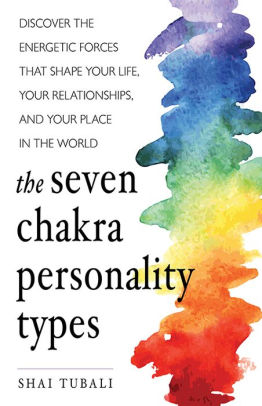The Seven Chakra Personality Types introduces us to the idea of personalities based on the characteristics of one's dominant chakras. Chapters for each of the seven chakras describe an archetypal personality. The idea is that we all have a dominant chakra type and then 2 subtypes.
The First Chakra: Builder
Second Chakra: Artist
Third Chakra: Achiever
Fourth Chakra: Caretaker
Fifth Chakra: Speaker
Sixth Chakra: Thinker
Seventh Chakra: Yogis
In some ways these personalities may seem familiar as it bears resemblance to other personality tests like the Myers-Brigg known for helping people find their vocation or Dr. Fisher's personality types of Builder, Negotiator, Explorer, Director used to help people find their love match. The obvious difference here is that the personality is attributed to the chakra system. If you are familiar with other personality tests, you will doubtless find yourself comparing them. The grouping of traits are not necessarily the same but the human condition is a constant.
Most prior books on chakras have focused more on health and healing and spirituality rather than on personality and the psychological impact of dominant chakra types. Each type is described according to the percent of people in the population who are this type; the public domain in which they dominate such as entertainment, competitive sports, non-profits, etc.; the professions is which they frequently are employed; their Dosha constitution; shadow self, or how an unbalanced chakra type behaves and ways to remedy these faults; time zone, that is to say are they oriented to past, future, present; traditional animal and famous figures. Some advice is also given on how to fulfill and balance one's chakra personality type.
Generally, this is a well organized system. At the end of each chapter is a quiz to figure out if this chakra is a strong influencer of one's own personality. In Part IV: Applying the System, how to figure out dominant and subdominant types is discussed more. It might have been helpful to go into this more at the beginning of the book. While the subtypes are mentioned early on, somehow I didn't understand how to assess the subdominant second and third types until reading the last section. Some readers might want to look at this last section first to help with their assessment process. It should be noted that if each of the dominant chakra types with their subdominant types were described in full, this would be an enormous book. That leaves the readers to figure out for themselves how the influence a dominant chakra type is softened, changed, or challenged by the subdominant types. The author offers a glimpse into how this is done with some examples.
The Seven Chakra Personality Types is an interesting expansion of the use of the chakra system and may help readers identify the influences that shape their lives and relationships with others.
Recommended
~review by Elsie Smyte
Author: Shai Tubali
Conari Press, 2018
268 pages, $18.95

